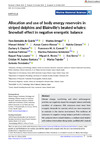Identificador persistente para citar o vincular este elemento:
https://accedacris.ulpgc.es/jspui/handle/10553/135659
| Título: | Allocation and use of body energy reservoirs in striped dolphins and Blainville's beaked whales: Snowball effect in negative energetic balance | Autores/as: | Bernaldo De Quirós Miranda, Yara Arregui Gil,Marina Arbelo Hernández, Manuel Antonio Castro Alonso, Ayoze Camara, Nakita Clayton, Zachary S. Consoli, Francesco M.A. Fahlman, Andreas Palomino-Schätzlein, Martina Puig Lozano,Raquel Patricia Rivero Santana, Miguel Antonio Sierra Pulpillo, Eva María Suarez Santana, Cristian Manuel Tejedor, Marisa Fernández Rodríguez, Antonio Jesús |
Clasificación UNESCO: | 310907 Patología 240119 Zoología marina |
Palabras clave: | Adaptations Bioenergetics Body condition Catabolism Climate change, et al. |
Fecha de publicación: | 2024 | Proyectos: | Patologia Embolica " Gaseosa / Grasa " en Cetaceos | Publicación seriada: | Marine Mammal Science | Resumen: | Climate change, overfishing, and other anthropogenic activities can negatively impact the energetic balance and body condition of cetaceans. Still, cetaceans must meet their energetic demands for survival, which are more expensive to maintain in the marine environment. The resilience of cetaceans to negative energy balance periods is unknown. We analyzed where striped dolphins, a medium-sized dolphin with shallow-intermediate diving habits, and Blainville's beaked whales, a larger odontocete with an extreme diving profile, store their energy reserves and how they use that energy. We performed dissections of body mass compartments of fresh dead adults of similar total body lengths but different body masses, determined the lipid and protein content of blubber and muscle, and calculated oxygen stores and the aerobic dive limit. Proteins in muscle were the largest source of energy stores for both species, followed by lipids in the blubber and muscle. Both species catabolized blubber and muscle simultaneously when losing body mass to avoid impairing other important functions. When these functions are impaired, a cascade of increased field metabolic rate and decreased energy intake may occur, decreasing their resilience to environmental challenges and making them more susceptible to diseases, ultimately resulting in death by starvation. | URI: | https://accedacris.ulpgc.es/handle/10553/135659 | ISSN: | 0824-0469 | DOI: | 10.1111/mms.13200 | Fuente: | Marine Mammal Science [ISSN 0824-0469] (Noviembre 2024) |
| Colección: | Artículos |
Citas de WEB OF SCIENCETM
Citations
1
actualizado el 15-feb-2026
Google ScholarTM
Verifica
Altmetric
Comparte
Exporta metadatos
Los elementos en ULPGC accedaCRIS están protegidos por derechos de autor con todos los derechos reservados, a menos que se indique lo contrario.
